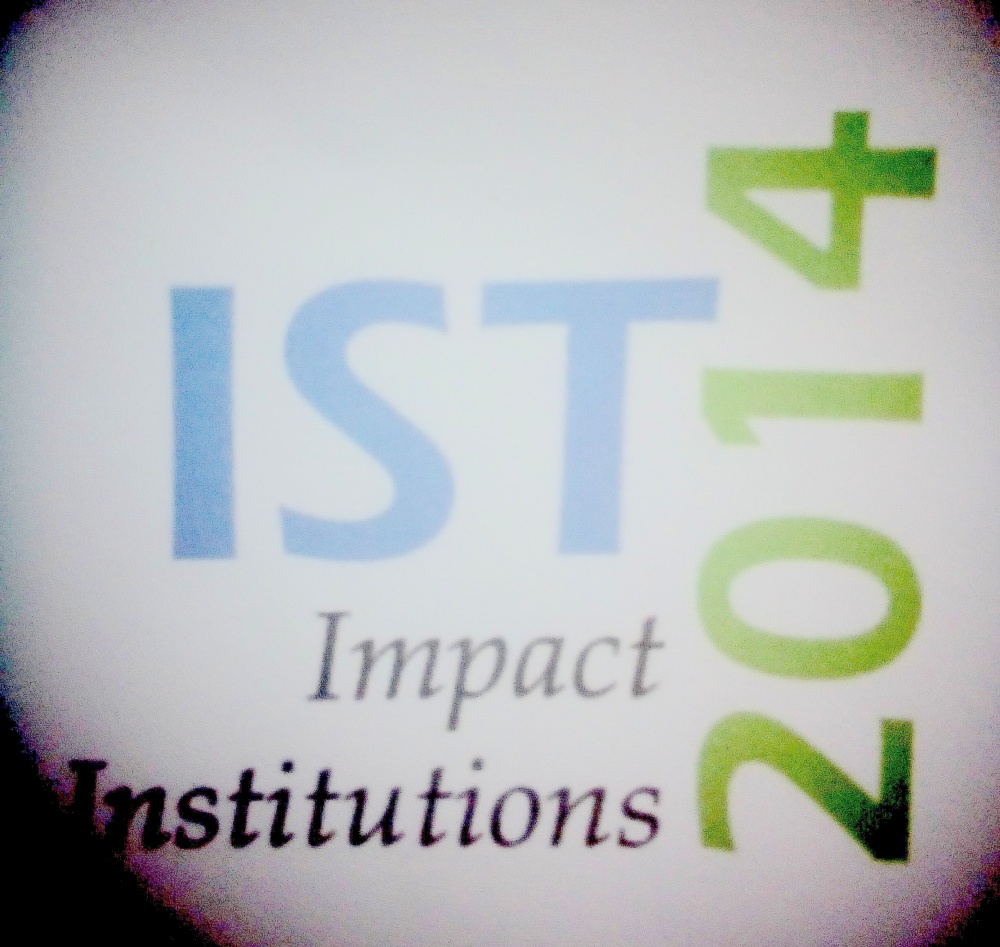Two weeks ago, I was presenting my PhD research at the International Sustainability Transitions Conference in Utrecht, Netherlands convened by the Sustainability Transitions Network.
Impact. The first theme of the conference was called ‘Impact’, focusing on what impact transition researchers have on society. In her opening keynote, Marjan Minnesma reminded the participants of the urgency of the ecologic crisis – I had actually kind of forgotten how bleak the picture is when it comes to climate change and biodivesity. She made a vibrant call to turn into scientisvists = scientists + activists; to reach to the public more boldly. This is one more confirmation that research initiatives focusing on societal impact (like transition>>lab!) are very much required. The Degrowth conference in Leipzig, blending activists and scientists, was proposed by Felix Rauschmayer as a possible avenue for research to make an impact.

Institutions. The second theme was looking into the role of institutions in sustainability transitions. AS a result this year’s edition displayed a significant number of presentations focusing on the role of social innovation and new institutional arrangements. There were quite a few presentations on the role of bottom-up renewable energy development and the forging of new forms of institutional arrangements. Grassroots initiatives such as Transition Towns and Ecovillages were featured and analysed within the context of the Multilevel Perpespective (Niche/Regime/Landscape) and Johan Schot in his keynote stressed the role of activists in innovation. This was a pleasant surprise as the existing transition literature focuses mainly on the study of technological innovation and its development in niches – as protective spaces – allowing a further translation to mainstream regimes. The institution theme was further consolidated by a great keynote by Tine de Moore on the history of bottom-up institutional arrangements. She observes that we’re in the middle of a third wave of citizens collectivities (cooperatives, commons-based initiatives) started in 2005, which marks, as the two previous ones, a particular moment of the transformation of our socio-economic system.
Smart cities. Cities had only a minor focus in this conference. A literature review on the Geography of Transitions (older version) provided a useful overview of the current status quo of transition research in integrating the role space plays in transitions dynamics. A small number of presentations specifically mentioned the concept of smart cities, and mainly around the topic of energy (smart-grids, smart metering). In my own presentation I proposed a critique of the current smart cities approach which has a strong bias for business and (local) government actors, overlooking the role of civil society (beyond the individual citizens) and ultimately being blind to issues of power related to the governance of data and information (post to come soon on the topic, stay tuned!).
(Digital) social innovation. With several paper presentations, social innovation is getting big(ger) in the transition research community as it becomes clear that looking only at technological development overlooks a huge potential for transformation. Flor Avelino and Julia Wittmayer presented the promising TRANSIT project that aims at developing a theory of transformative social innovation building upon the empirical analysis of transnational networks such as The Impact-Hub or Ashoka. On my turn I presented some ideas on how collaborative resources managed as commons such as online maps may support the replication and diffusion of social innovation, but also networking of local actors across scales. I proposed to analyse digital information resources like Mundraub, 596 Acres, Flaechen in Leipzig as information commons (as per Hess and Ostrom 2007). Feedback was enthusiastic (on bringing the commons approach to the transition literature and focusing on digital social innovation) but also critical (on the categorization of such information resources as a commons).
(Un)Open-access. At a few occasions Jeroen van den Berg, Editor-in-chief of the Journal of Environmental Innovation and Societal Transition, encouraged scientists to cite the journal in their work to further build the profile of the community. It stroke of few of us (youngest ones) that the journal is a locked behind a pay-wall, being published by Elsevier. Thinking of societal impact implies systematic open-access of publications, at least!
Education. To end this post, I’d mention the (disruptive) intervention of Simon Kavanagh from Kaos Pilot who presented his views on what should education be: “the Education is not about making people fit into the future-it´s about the frames for them to participate in creating it”. Should there be sort of a transition university where students would focus on driving community change? Well here you go: http://transition-university.org/!
A few presentations that I would highlight:
- “Let’s do it ourselves” Individual motivations for investing in renewables at community level by Gabriella Doci et al.
- Regime resistance against low-carbon energy transitions: Introducing politics and power into the multi-level perpective by Franck Geels
- Game changers and transformative social innovation. The case of the economic crisis and the new economy by Flor Avelino, Julia Wittmayer et al.
- Institutional arrangements in the transition towards renewable energy! A qualitative study on bottom-up initiatives by Eva Fleiss et al.
- Enriching the conceptualization of the management of sustainability transitions with individual capablities and social practices by Felix Rauschmayer, Niko Schäpke et al.
- The Geography of sustainability transitions: A Literature review by Teis Hansen and Lars Coenen
- Framing sustainable transitions, relational spatial constructions and the multu-level perpective by Angie Silva and Paul Mercieca
- Intentional communities and the Global Ecovillage Network as innovative models for sustainability transition policy by Iris Kunze and Flor Avelino
- Social learning, empowerment and social capital development for local sustainability transitions: insights on social impcts of transition management projects by Niko Schäpke et al.
- Scaling the impact of transition initiatives through collective action: A first conceptualization of enabling institutional arrangements by Felix Spira, Niki Frantzeskaki, Derk Loorbach
Note: unfortunately all papers connected to those presentations are only available to conference participants here: http://programme.exordo.com/ist2014/
